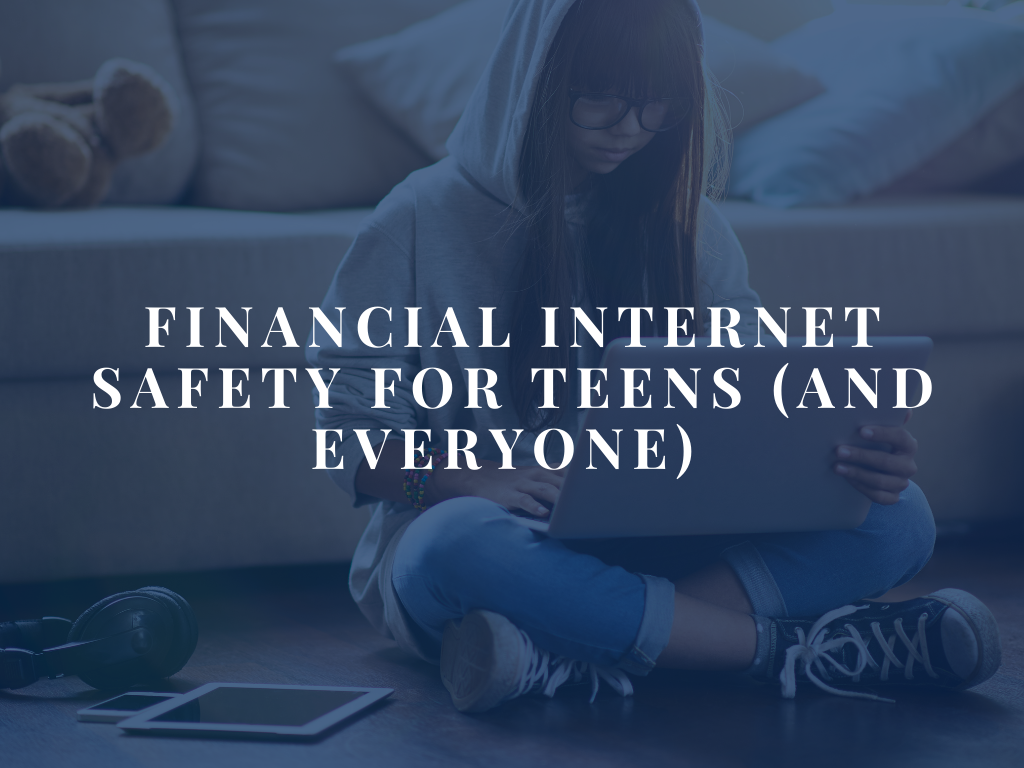
Amid constant headlines of scams, identity theft, hackings and more, the internet can begin to feel like a scary place. As financial advisors, we work with many parents and grandparents of teens. Like a lot of our clients, you may find yourself worried for both yourself and your child or grandchild when it comes to financial internet safety. Avoiding the online world completely isn’t realistic. Your next best option is educating yourself and your teen. Keeping safe on the internet isn’t always easy, but these tips can help.
Password Management
One of the simplest and most effective ways to keep yourself safe on the internet, financially or otherwise, is to manage passwords responsibly. There are a couple of ways to do this.
- First, never share passwords. Even passwords to sites that seem harmless could provide someone with enough information to log in to other sites (if you use the same or similar password), steal personal information or pose as you as part of a scam.
- Second, change your passwords regularly and avoid using the same password for multiple sites. If you’re worried about remembering all your passwords, you could use an online password manager, such as LastPass, Google Password Manager, 1Password or Bitwarden. A password manager is essentially an encrypted digital vault that stores your login information. Some password managers can even generate random passwords, which are typically much stronger than one you might make yourself. An online password manager can also help you avoid storing passwords in insecure places, such as the classic sticky note on your computer.
Trustworthy Websites
Both kids and adults should always be mindful of the websites they’re visiting, especially when entering personal or financial information. How do you know if a website is trustworthy? While not foolproof, looking at the URL (address bar) can help in two ways.
First, see if the URL starts with “http” or “https.” The “s” means the site owner is transferring data using a secured encryption process. A secured encryption process does not guarantee that the site is trustworthy, but it does show that the transfer of data is happening securely. Conversely, an “http” site isn’t necessarily trying to scam you, but since data is not transferred using encryption, you want to avoid providing any personal information and definitely do not provide any financial information, such as a credit card number.
Secondly, you should look at the URL to ensure the domain name is accurate. Many scammers choose domain names that look similar to legitimate sites, for example - G00gle.com (using zeros instead of “o”s).
Stay Aware of the Latest Scams
Keeping up with every new scam will drive you crazy, but a general awareness of the type of scams occurring can help you stay vigilant. When you hear of a scam that’s relevant to your teen, share it with them. The goal here is not to terrify yourself or your teen but simply to remain alert and savvy about financial internet safety.
One specific kind of scam to talk about with your child or grandchild is phishing. These scams involve someone reaching out to get personal information from you, often include a believable story, and may be incredibly targeted. For example, scammers could send emails to see who they receive out of office messages from. If yours included a reference to a conference you were attending, a scammer could reach out to your child pretending to be you and asking them to send money because you forgot your wallet. One of the best ways to avoid scams like this is to always call a person requesting money on the phone number you already have for them to ensure the request is legitimate.
Social Media and Financial Internet Safety
You’ve probably talked to your teen before about being mindful about what they put on social media, but even seemingly mundane information could be used by scammers, such as:
- School name
- Location
- Full name
- Date of birth
While in a perfect world you and your teen would avoid sharing any personal information, realistically, your child (and possibly you) will probably want to post about their birthday plans or attending school events. Decide as a family which information you are and are not comfortable having on social media and make sure your teen understands why. If some personal information is shared, such as the name of the school they attend, talk to your child about how they can remain vigilant of a scammer attempting to take advantage of this information. For example, if they’ve publicly posted about their school, anyone could message them pretending to attend the same school.
Conclusion
Much like driving a car, using the internet comes with some level of risk, but implementing some simple strategies can make your chances of keeping safe far higher. If you have questions about financial safety online, contact us to schedule an appointment.
Additional Resources for Internet Safety:
consumer.ftc.gov, "Password Checklist"
cnet.com, "Best Password Manager to Use for 2022"
texasattorneygeneral.gov, "How to Spot and Report Internet and Email Scams"
consumer.ftc.gov, "How To Recognize and Avoid Phishing Scams"
ftc.gov, "Social media a gold mine for scammers in 2021"
Need a Financial Advisor?
If you are currently looking for help with financial planning, contact us. We are happy to schedule an introductory meeting at your convenience.


